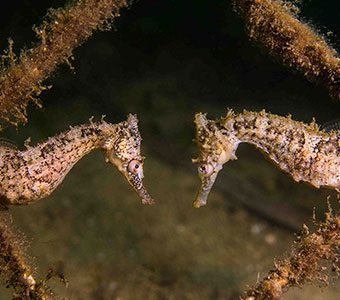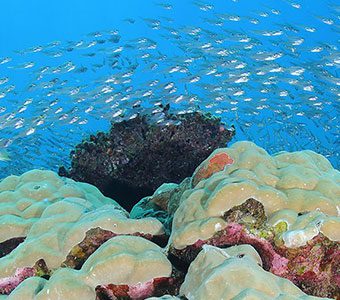As cephalopod lovers around the world celebrate the Oscar win for My Octopus Teacher, we thought it was worth taking a closer look at octopus’ behaviour. Many of us divers are certainly enamoured, watching these curious, intelligent creatures collect treasures, reach out for our cameras, and display generally quirky behaviour, but can they make friends?
Marine scientist, Macquarie University’s Professor Callum Brown takes a deep dive into octopus’ behaviour and highlights the important messages in the Oscar-winning documentary.
Even as a marine biologist, I was so deeply moved by My Octopus Teacher, I couldn’t help shedding a tear. It was a fabulous insight into an extraordinary creature that illuminated the marine environment in a way I haven’t seen since David Attenborough’s Blue Planet.
The documentary by Cape Town filmmaker Craig Foster depicts his growing bond with an octopus in the underwater kelp forest off South Africa’s Western Cape, where Foster, seeking to heal himself from burnout and depression, free dives every day for a year.
I don’t know if we can say the octopus made friends with Foster as such. While some cuttlefish and squid are social creatures, all 300 or so species of octopus are incredibly anti-social – they spend their whole lives by themselves, except for when they mate.
But they are unbelievably curious animals. Because they feed on lots of different animals in many different habitats, they are highly versatile, and being attracted to novel things is just one way of exposing themselves to potential new food items. They are constantly exploring their environment.
Once the octopus’s fear fades away and she habituates to Foster’s presence, the curiosity really takes over: what on earth is this weird alien thing that is coming down to visit her every day?
Experience with wild animals can change a person’s relationships with other people … if you have an overwhelming experience like that, your general capacity for empathy just increases.
The Octopus vulgaris – the most common octopus species – will approach just about anything they think is fun, interesting or different, and the ‘octopus teacher’ becomes so accustomed to the diver being there that she basically treats him as part of the environment.
It is clear she comes to trust him, and that is all part of the fear disappearing.
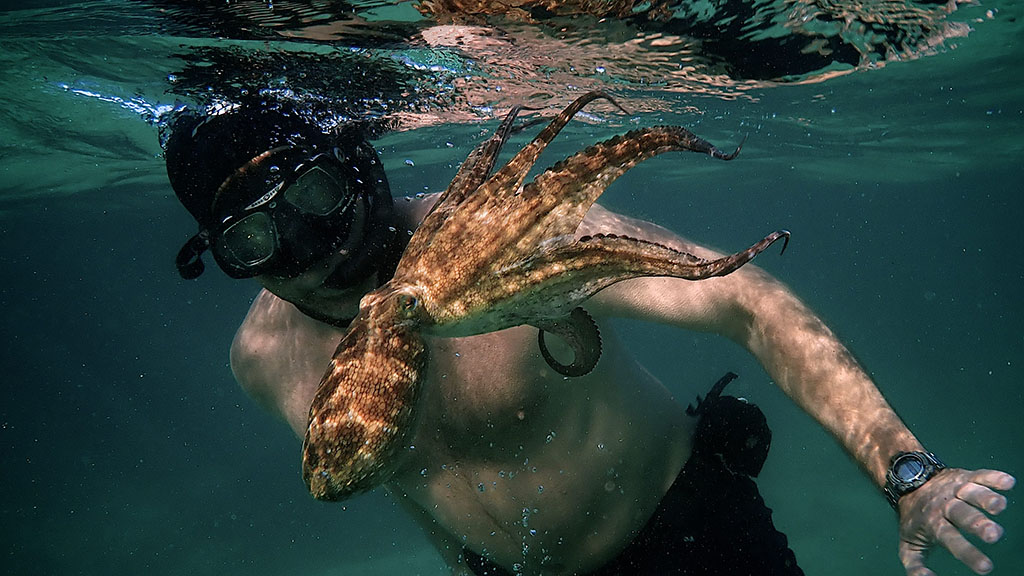
The magic of daily immersion
It always surprises me when a wild animal becomes accustomed to a person enough to break down that fear barrier, and it’s an incredible journey from that point onwards, in that few people experience it; it reminds me of Dian Fossey and her relationships with mountain gorillas. They are experiences that only come from immersing yourself in the same environment day after day.
I grew up snorkeling on some of the most pristine reefs in South East Asia, and the many years I spent doing that inspired me to become a marine biologist. I couldn’t help but become captivated by all the little things that were going on. As a biologist, when you do fieldwork in the same place over and over again, you become so familiar with it that you start to understand how it works and how things fit together; you see details that a casual visitor would miss.
Going to the same place every day is an amazing thing for anyone to do. Even if you just sat there and watched, you would see things you wouldn’t normally see.
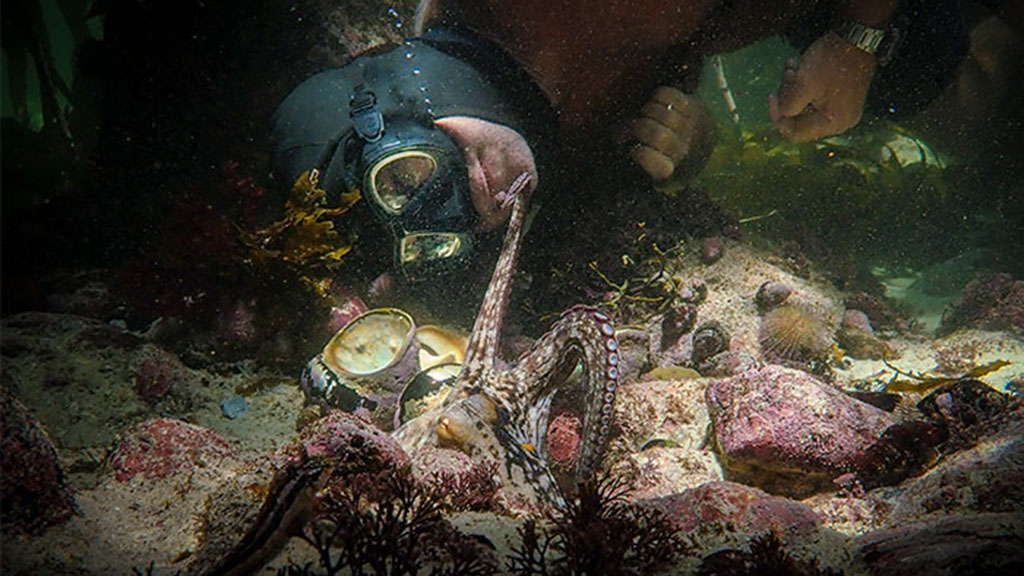
Entranced by a souped-up snail
This documentary is beautifully shot with lovely narration – Foster has a soothing voice, and the emotion portrayed by him is clearly genuine.
It has struck a chord with viewers, I think because it is a captivating storyline that tugs on many independent heartstrings simultaneously, and people are going to get hooked by any one of those.
Foster is trying to come back from depression and reconnect with his family and through his underwater experience, he rediscovers his son, begins to recover his health and has an amazing interaction with this animal, which I think most people can relate to in some shape or form.
You can’t help but tear up; you can’t help but feel the suspense when sharks are chasing it … it has a lot going for it. The octopus is such an extraordinary animal that even a documentary focusing on its behaviour would be amazing enough, but the connection it has with Foster is very impressive and takes it further.
And what makes the film extra special is that it is all happening with an invertebrate – basically a souped-up snail that also looks like an alien. No doubt we’d be captivated if the story was about a relationship with a wild mammal, say a bear, but this is a relationship with an octopus! Typically, if it’s not cute and furry nobody cares, but in this case we do. You can’t help but empathize with the protagonist.
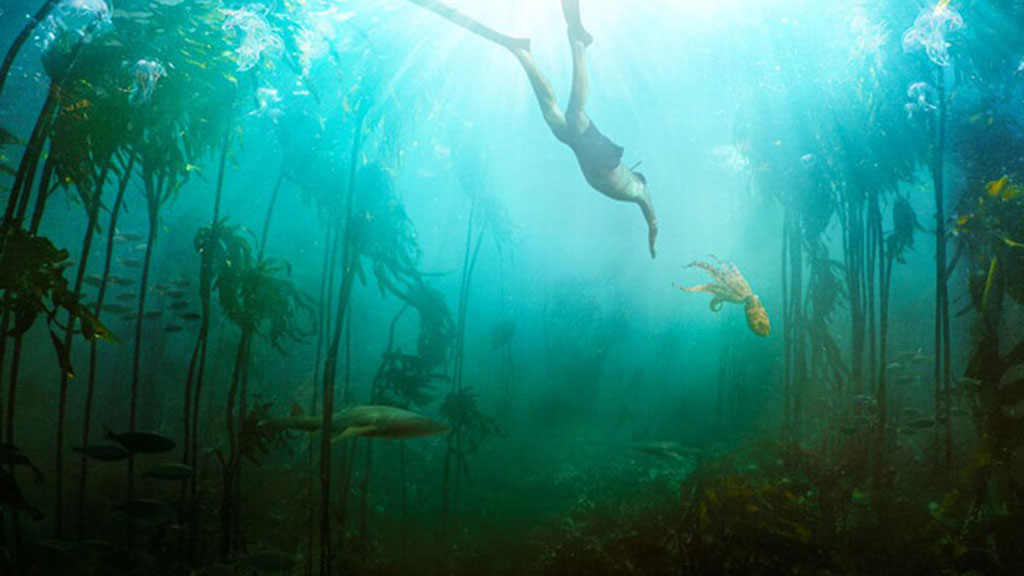
Short and spectacular lives
Most of the octopus behaviours we see in the documentary we know of – the bipedal walking, the use of shells and algae to hide itself, the amazing camouflage and changes of texture, pattern and colour – but to see one individual of one species doing it all in My Octopus Teacher, and to have it all explained in common language, is very cool.
Foster – who is not a biologist – does confuse evolution with individual learning.
When he talks about how octopus behaviour and physiology has changed over millions of years and how natural selection has focused the octopus to do all these different things, he is talking about evolution but confuses it with behaviour changes through individual learning over a single lifetime.
Octopuses are renowned for their flexibility and ability to learn new things, and that is because they only live for a year (and the vast majority of them don’t make it that far). They haven’t got much time, and they need to be super switched on to live the way they do – continually curious and exploring an environment shared with predators.
Every octopus is unique, they all learn and do different things and that all depends on their own singular experiences.
A classic one is how to escape from predators: do you wrap yourself up in algae, or do you use stones, or do you hide. Or how best to capture various prey items like lobster – all those sorts of thing are going to be individually learned.
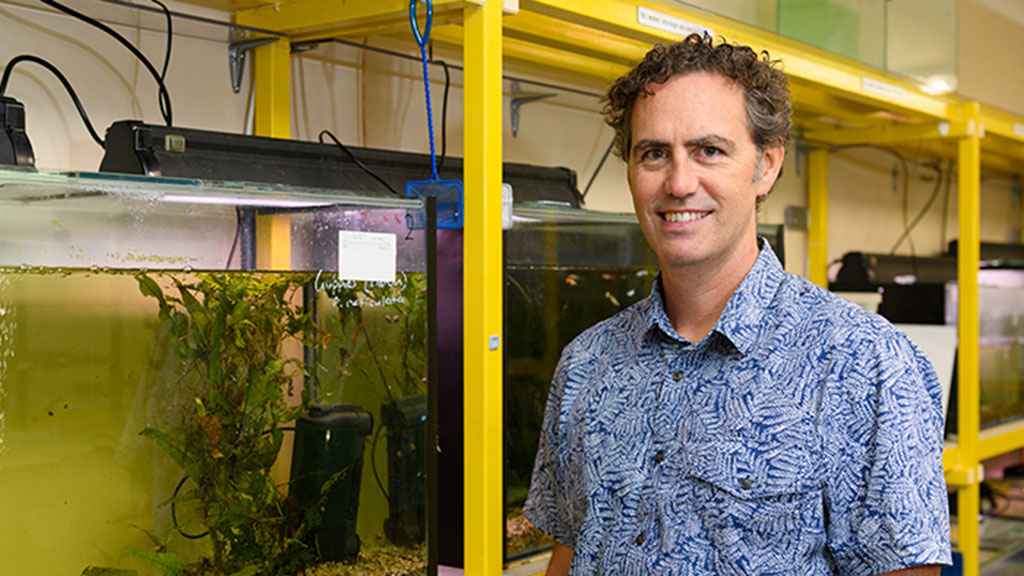
A reconnection with people and nature
Experience with wild animals can change a person’s relationships with other people, as happens with Foster. If you have an overwhelming experience like that, your general capacity for empathy just increases. You have a greater appreciation for life. It opens up a part of you that, if it wasn’t already opened, certainly will be now, making you more in tune with other people, animals in general, how the world works and how everything is connected. You start to see things from other people’s – and animals’ – perspectives.
The bigger, increasingly important point of this documentary – and it is one that Attenborough makes as well – is that we have become dangerously disconnected from nature. As humans, we overrun everything and live in this artificial, built-up, man-made world. It is a significant problem because if we don’t appreciate nature, we are not going to care, and if we don’t care there is no urgency for conservation, and we risk losing it all.
If a documentary like this can encourage people to reconnect and start to appreciate nature, that would be a really important step. There is no Planet B, and we are knowingly destroying Planet A. And like it or not, we are intertwined with nature and if we get rid of it, we are doomed as a species. We need to find ways to work with nature rather than fighting against it.
Dr. Brown’s closing message emphasizing the importance of reconnection with nature is poignant – and how wonderful that the connection everyone is talking about now, is with a “souped-up snail” – not a big-eyed, furry mammal!
How many of you, having watched My Octopus Teacher, have sworn off eating octopus? I have certainly had quite a few people tell me so. Let’s hope, having seen this, people start thinking about (and caring for) our precious marine life a bit more, after all:
“… if we don’t appreciate nature, we are not going to care, and if we don’t care there is no urgency for conservation, and we risk losing it all.”
To read more of Dr. Callum Brown’s fascinating articles – subscribe to Macquarie University’s The Lighthouse.

